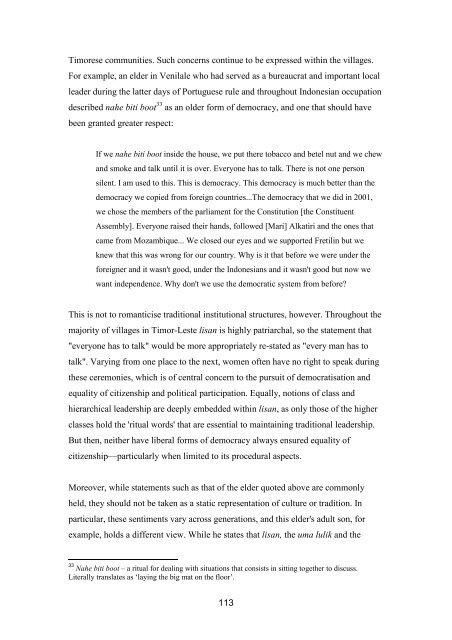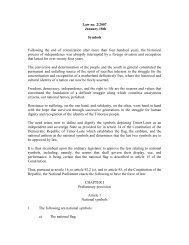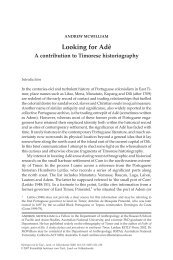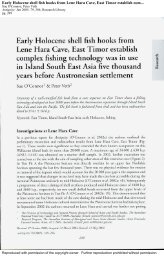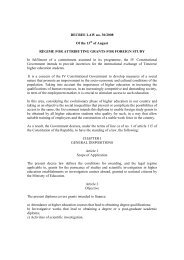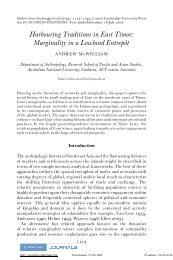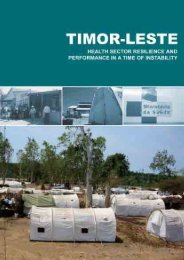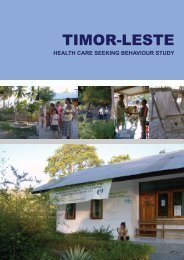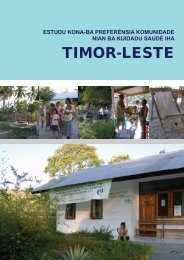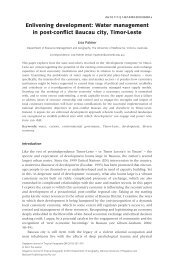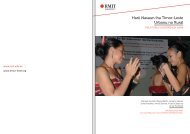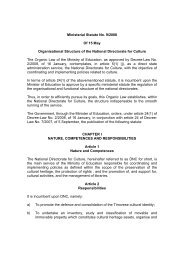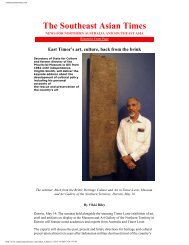Local Governance in Timor-Leste - Secretaria de Estado da Arte e ...
Local Governance in Timor-Leste - Secretaria de Estado da Arte e ...
Local Governance in Timor-Leste - Secretaria de Estado da Arte e ...
- No tags were found...
Create successful ePaper yourself
Turn your PDF publications into a flip-book with our unique Google optimized e-Paper software.
<strong>Timor</strong>ese communities. Such concerns cont<strong>in</strong>ue to be expressed with<strong>in</strong> the villages.For example, an el<strong>de</strong>r <strong>in</strong> Venilale who had served as a bureaucrat and important locallea<strong>de</strong>r dur<strong>in</strong>g the latter <strong>da</strong>ys of Portuguese rule and throughout Indonesian occupation<strong>de</strong>scribed nahe biti boot 33 as an ol<strong>de</strong>r form of <strong>de</strong>mocracy, and one that should havebeen granted greater respect:If we nahe biti boot <strong>in</strong>si<strong>de</strong> the house, we put there tobacco and betel nut and we chewand smoke and talk until it is over. Everyone has to talk. There is not one personsilent. I am used to this. This is <strong>de</strong>mocracy. This <strong>de</strong>mocracy is much better than the<strong>de</strong>mocracy we copied from foreign countries...The <strong>de</strong>mocracy that we did <strong>in</strong> 2001,we chose the members of the parliament for the Constitution [the ConstituentAssembly]. Everyone raised their hands, followed [Mari] Alkatiri and the ones thatcame from Mozambique... We closed our eyes and we supported Fretil<strong>in</strong> but weknew that this was wrong for our country. Why is it that before we were un<strong>de</strong>r theforeigner and it wasn't good, un<strong>de</strong>r the Indonesians and it wasn't good but now wewant <strong>in</strong><strong>de</strong>pen<strong>de</strong>nce. Why don't we use the <strong>de</strong>mocratic system from before?This is not to romanticise traditional <strong>in</strong>stitutional structures, however. Throughout themajority of villages <strong>in</strong> <strong>Timor</strong>-<strong>Leste</strong> lisan is highly patriarchal, so the statement that"everyone has to talk" would be more appropriately re-stated as "every man has totalk". Vary<strong>in</strong>g from one place to the next, women often have no right to speak dur<strong>in</strong>gthese ceremonies, which is of central concern to the pursuit of <strong>de</strong>mocratisation an<strong>de</strong>quality of citizenship and political participation. Equally, notions of class andhierarchical lea<strong>de</strong>rship are <strong>de</strong>eply embed<strong>de</strong>d with<strong>in</strong> lisan, as only those of the higherclasses hold the 'ritual words' that are essential to ma<strong>in</strong>ta<strong>in</strong><strong>in</strong>g traditional lea<strong>de</strong>rship.But then, neither have liberal forms of <strong>de</strong>mocracy always ensured equality ofcitizenship—particularly when limited to its procedural aspects.Moreover, while statements such as that of the el<strong>de</strong>r quoted above are commonlyheld, they should not be taken as a static representation of culture or tradition. Inparticular, these sentiments vary across generations, and this el<strong>de</strong>r's adult son, forexample, holds a different view. While he states that lisan, the uma lulik and the33 Nahe biti boot – a ritual for <strong>de</strong>al<strong>in</strong>g with situations that consists <strong>in</strong> sitt<strong>in</strong>g together to discuss.Literally translates as ‘lay<strong>in</strong>g the big mat on the floor’.113


